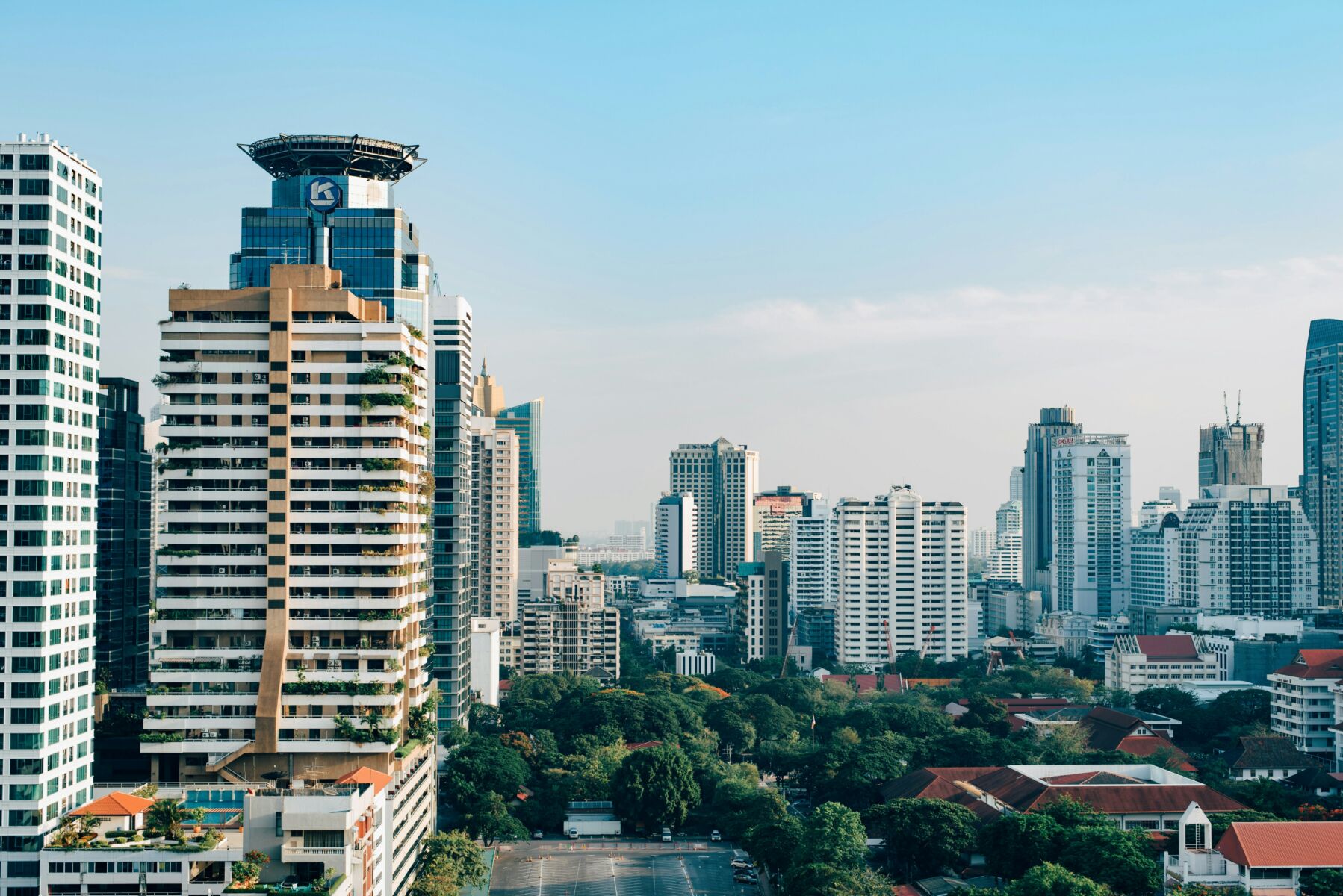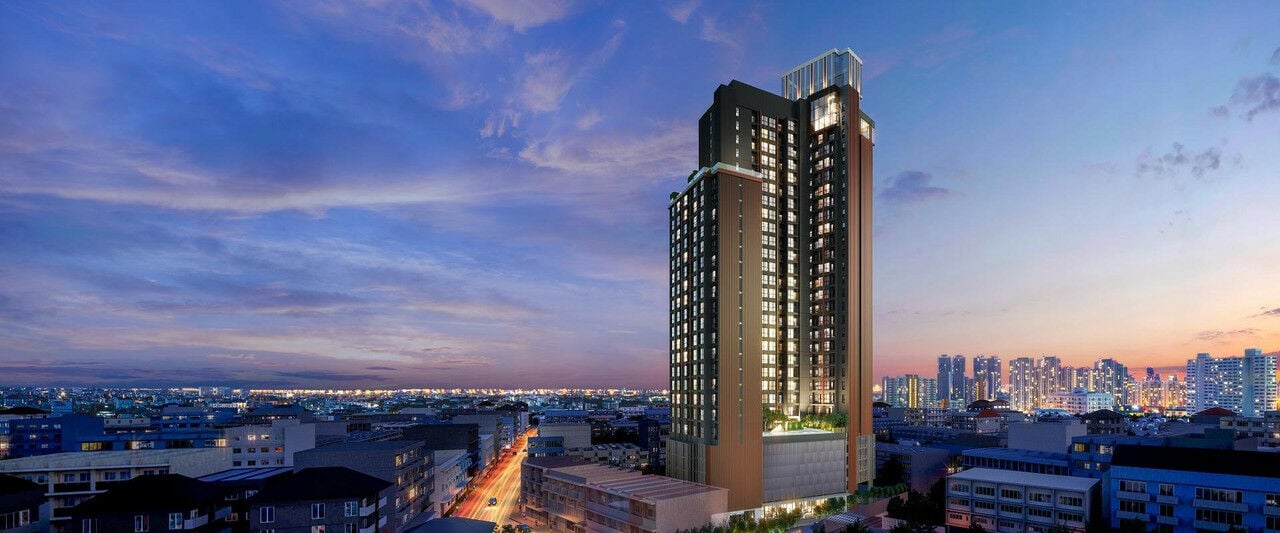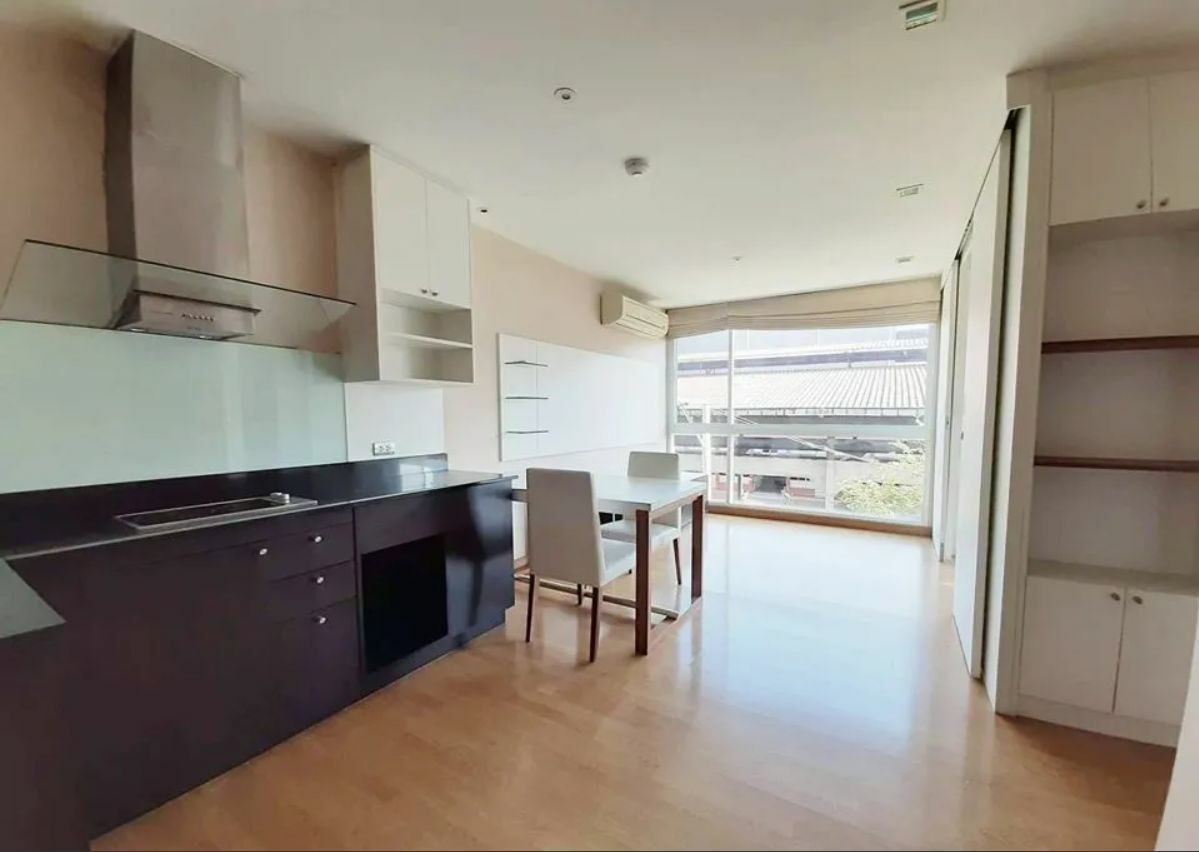Real estate market trends in Thailand 2024 to 2025

Thailand’s real estate market is set to experience a transformative period from 2024 to 2025, driven by increasing foreign investment and a robust tourism sector. The Kingdom is becoming a hotspot for property investors seeking high returns and growth potential. With urbanisation accelerating, cities like Bangkok, Chiang Mai, and Phuket are witnessing a surge in demand for residential and commercial properties.
1. Market growth and economic recovery
Thailand’s real estate market is set to experience remarkable growth between 2024 and 2025. Economic improvements and government initiatives are key drivers.

Factors of economic recovery
- Economic growth: Thailand’s economy is expected to grow at a rate of around 3.4% in 2024, which is good news for the real estate market. As the economy grows, people have more money to spend, which usually means they can buy more properties.
- Increase government spending: Government spending on infrastructure, especially in transportation, is another major factor. New transportation projects can make certain areas more accessible, increasing the demand for residential properties along these new metro lines. This makes it easier for people to live farther from their workplace while still maintaining a reasonable commute.
- Tourism recovery: Tourism is also bouncing back. More tourists means more demand for second homes and investment properties, especially in popular areas. If people continue to travel to Thailand, places like Phuket and Pattaya are likely to see more interest from foreign buyers.
Another positive sign is the increase in expatriates working and investing in Thailand. They often look for long-term rental properties or even buy homes, which adds more demand to the market.
How the market will be affected
Sales of residential properties are expected to recover, increasing by 2-3% annually over the next few years. While that growth rate is good, it’s still below pre-pandemic levels.
As the economy improves, consumer purchasing power should recover too. That means more people will likely start buying homes again, which will support the overall market growth.
However, there are still challenges. Rising financial costs and high household debt levels may make some people more cautious about buying property. Additionally, unsold inventory from past years can slow down market growth, as sellers may lower prices to get rid of older listings before introducing new properties.
Despite that, recent statistics indicate a 15% year-on-year increase in property transactions which highlights the market’s dynamism. The government’s proactive policies, such as the Eastern Economic Corridor (EEC) initiative, are further fuelling this growth by attracting international businesses and investors. As Thailand continues to modernise its infrastructure and enhance connectivity, the next few years promise exciting opportunities for those looking to capitalise on the emerging real estate markets.
2. Shift towards low-rise development in Thailand’s real estate market
Low-rise housing developments have gained significant traction in Thailand, especially in the Bangkok metropolitan area. This trend, driven by changing buyer preferences, reflects a notable shift in the real estate market.

Factors driving demand
- Increased demand for larger spaces: The Covid-19 pandemic has led many buyers to seek larger living spaces that accommodate new work-from-home arrangements and family needs. Low-rise homes, such as single-detached houses and townhouses, offer the necessary space and functionality that condominiums typically don’t provide. This demand peaked in 2021 when the supply of new low-rise housing surpassed that of condominiums for the first time since 2011.
- Affordability and value: Low-rise housing is often seen as more affordable compared to high-rise condominiums, especially in suburban areas. As land prices rise, the cost of low-rise homes remains competitive with smaller downtown condos. This makes low-rise properties an attractive option for buyers looking for better value for money. For instance, developers like Sansiri reported that 64% of its presales in early 2022 were for low-rise housing, showcasing the strong demand in this sector.
- Strong market performance: Major developers such as Sansiri and AP have reported strong presales in the low-rise segment, with significant percentages of their sales coming from this category. These homes provide the space that families need while still remaining within budget, a key consideration in today’s market.
How the market will be affected
There has been a notable increase in luxury and super-luxury low-rise housing projects, particularly in eastern Bangkok. These developments cater to affluent buyers seeking high-quality living spaces with modern facilities, architecture, and decor. This trend indicates that even the high-end market is moving toward more spacious and comfortable living options.
While low-rise housing is thriving, it is also competing with mid-range condominiums, especially in suburban areas. Developers are meeting this competition by offering larger, family-sized units in low-rise projects, appealing to buyers who prioritise space over location. They provide a practical solution for families who need more room but don’t want to be too far from any of the conveniences that any of the Thai cities offer.
Despite these positive trends, challenges such as rising construction costs and high levels of consumer debt may impact the affordability and attractiveness of low-rise housing. Developers remain cautious about launching new projects due to economic fluctuations. Nevertheless, the ongoing trend towards low-rise housing is expected to shape the future view of Thailand’s real estate market from 2024 to 2025.
For those interested in exploring this market, consulting with a real estate agent can provide valuable insights. Services like Fazwaz can help you guide the evolving trends and find the best property that meets your needs. For those interested, there is a 50 SqM condo with 1 bedroom and 1 bathroom that is available for sale. It is part of the Tree Condo LUXE Sukhumvit 52 project in Bang Chak, Bangkok. You can view the listing to learn more.

3. Increased foreign investment in Thailand’s real estate market
Foreign investment in Thailand’s real estate market has seen a groundbreaking rise in 2024. A 58% increase in foreign direct investment (FDI) compared to the previous year reveals favourable conditions for investors.

Key drivers of increased foreign investment
- Favourable investment policies: The Thai government has rolled out several policies to attract foreign investors, including allowing foreigners to own condominiums outright and extending leasehold rights for up to 30 years with renewal options. These policies make it easier and more appealing for foreigners to invest in the property market.
- Resilient tourism sector: With millions of tourists visiting Thailand each year, there’s a strong demand for rental properties in popular spots like Bangkok, Phuket, and Pattaya. This steady influx of tourists makes investing in rental properties highly lucrative, providing consistent rental yields.
- Growing expatriate community: Thailand’s urban centres are witnessing a growing number of expatriates. This trend has created a robust rental market targeting expatriates looking for comfortable living spaces. Foreign investors find this market segment promising as it offers stable rental income.
How the market will be affected
Expect an increased interest in residential properties, especially in cities and tourist hotspots. High rental yields and the potential for property appreciation make this sector attractive to foreign investors. Special mention should be given to low-rise housing developments, which are gaining popularity due to their affordability and functionality.
Demand for office spaces and retail properties will rise as businesses grow and tourism rebounds. Mixed-use developments combining residential, commercial, and retail spaces are especially appealing. Investors are capitalising on these opportunities for diversified revenue streams.
With the growth of e-commerce, there’s a rising need for logistics facilities. Areas like the Eastern Economic Corridor (EEC) offer strategic locations and developed infrastructure, making them hotspots for foreign investment in industrial properties.
4. Resilience in tourist areas
Planning to invest in Thailand’s real estate market? You’ll be glad to know that tourist areas are bouncing back. From 2024 to 2025, real estate in hotspots like Bangkok, Phuket, and Chiang Mai is set to thrive.

Key drivers of resilience in the tourist areas
Additionally, with real estate agents like Fazwaz providing expert guidance, it’s easier than ever to find the best property to invest in. The combination of rising tourist numbers and improved infrastructure means that properties in these areas are likely to appreciate in value.
Those interested can find a property to buy in Phuket. Dcondo Reef Phuket has rooms that are expected to be completed in September 2024. You can view the listing here to learn more and a lot of projects like these of housing and properties being completed are popping up all over tourist-heavy cities such as Phuket, Pattaya, and Bangkok.

How the market will be affected
The hospitality market will see new hotels and resorts popping up to meet the growing demand. But with more competition, properties will need to stand out through quality and excellent service. Real estate agents can offer valuable advice on which investments have the potential for high returns.
Residential properties in tourist hotspots are also gaining interest from foreign buyers. Phuket and Chiang Mai are especially popular due to their stunning scenery and lifestyle offerings. Investors seeking vacation homes or rental properties should keep these areas on their radar.
The demand for commercial properties, such as shops and restaurants, is expected to rise alongside the return of tourists. Business owners will focus on crafting unique experiences to draw in visitors. This can lead to higher foot traffic and, consequently, better business performance.
From 2024 to 2025, Thailand’s tourist areas offer promising opportunities for real estate investments. Working with experienced agents like those from Fazwaz can help you guide the market and seize the best opportunities.
Emerging challenges to the real estate market in Thailand
Emerging challenges can impact Thailand’s real estate market moving into 2024 and 2025. These factors can shape whether an investment becomes profitable or risky for potential buyers.

Political uncertainty
The recent transition to a new prime minister introduces political uncertainty. When a new government takes over, investors often adopt a wait-and-see approach. This cautious attitude can lead to temporary slowdowns in investment activity. The new administration’s policies on foreign investment, property ownership regulations, and infrastructure development will be crucial.
For instance, changes in property ownership rules could affect foreign buyers’ interest in places like Phuket or Pattaya. If the new government prioritises economic growth and infrastructure projects, it could boost investor confidence. On the flip side, instability or unfavourable policies might lower investment activity, impacting overall market health.
How the market will be affected
Economic fluctuations will significantly affect Thailand’s real estate market in the coming years. Global conditions and domestic policies will play a role here. Key areas to watch include interest rates, inflation, and tourism recovery.
For example, rising interest rates could make mortgages more expensive, cooling the property market. Inflation affects construction costs, which could increase property prices. Tourism recovery, especially in tourist hotspots like Bangkok and Phuket, will influence demand for hotels and vacation rentals.
Investors should stay informed about these trends to make smart decisions. Real estate agents like Fazwaz can offer valuable insights into market conditions and opportunities. By keeping an eye on interest rates, inflation, and tourism numbers, potential buyers can stay ahead of market shifts.
Understanding these emerging challenges can help investors guide Thailand’s real estate market in 2024 and 2025 effectively.
Is it a good time to invest in the real estate market in Thailand now?
With the expected growth in Thailand’s real estate market from 2024 to 2025, now might be the perfect time to look into investing in properties. Thailand offers a promising mix of economic recovery, increasing tourism, and government support for infrastructure projects.
Where should you invest next in Thailand?
| Location | Overview | Investment Potential |
|---|---|---|
| Bangkok | The capital and economic hub of Thailand features a mix of modern high-rises, luxury condos, and traditional homes. | Strong demand due to its status as a regional business centre and top tourist destination. Areas like Sukhumvit, Sathorn, and Silom are popular. Projected 5% annual house price growth. |
| Phuket | Known for stunning beaches and vibrant lifestyle, a favourite among tourists and property investors. | Lucrative rental yields, often exceeding 6%. Ideal for investing in beachfront villas and upscale condos. Lower property prices compared to other international destinations. |
| Chiang Mai | Renowned for its rich cultural heritage and serene environment, appealing to retirees and slow-paced living seekers. | Affordable property prices and increasing demand for long-term rentals. The growing expatriate population provides steady rental income and potential appreciation. |
| Pattaya | A vibrant resort city known for its entertainment and evolving real estate market. | Affordable property prices with high rental yields. Popular neighbourhoods include Jomtien and Naklua. Proximity to Bangkok and infrastructure developments enhance its appeal. |
| Hua Hin | Combines a relaxed coastal lifestyle with a burgeoning real estate market, popular among retirees and holidaymakers. | High demand for luxury condos and beachfront villas. Infrastructure improvements, including highway expansions and planned high-speed rail links to Bangkok, make it an attractive investment destination. |
How Fazwaz can help you
Extensive listings: Fazwaz provides access to over 200,000 properties, including condos, houses, and villas across Thailand, making it easier to find the best property to meet your needs.
Detailed property information: Each listing on Fazwaz includes thorough details about the property such as price, location, and amenities. This helps you make informed decisions by comparing multiple options effectively.
User-friendly interface: Fazwaz’s simple and intuitive interface allows you to filter your search by price, location, map, and other criteria, helping you narrow down your options quickly.
Expert advice: The real estate agents at Fazwaz offer valuable insights and guidance, ensuring you are well-informed about market trends and investment opportunities. For instance, Fazwaz highlights specific areas in Phuket and Bangkok that are expected to see growth due to increasing tourist numbers and new infrastructure.
Monitoring political developments, assessing market conditions, and considering long-term trends are crucial steps when investing in Thailand’s real estate market. By incorporating expert advice from platforms like Fazwaz, you can strategically position yourself to seize emerging opportunities.
Frequently asked questions
What are the main factors driving the growth in Thailand’s real estate market from 2024 to 2025?
The growth is driven by economic recovery, government initiatives, and a rise in tourism. Additionally, investments in infrastructure and a preference for low-rise housing developments in Bangkok contribute significantly.
Which areas in Thailand are seeing the most foreign investment in real estate?
Cities and tourist areas such as Bangkok, Phuket, and Chiang Mai are attracting the most foreign investments in the real estate market.
Is it a good time to invest in Thai real estate?
Yes, now is considered a good time to invest due to the favourable market conditions, economic recovery, and wide range of property options available. Fazwaz offers expert guidance to help investors make informed decisions.
What types of properties are currently popular in Bangkok?
Low-rise housing developments have become increasingly popular in Bangkok due to their practical space and affordability.
Can Fazwaz help with investments in the hospitality and commercial real estate sectors?
Yes, Fazwaz provides expert guidance and access to various opportunities in both the hospitality and commercial real estate sectors in Thailand.
What should investors monitor for successful real estate investments in Thailand?
Investors should monitor political developments, market conditions, and long-term trends to make successful real estate investments in Thailand.
Sponsored
Latest Thailand News
Follow The Thaiger on Google News:


























